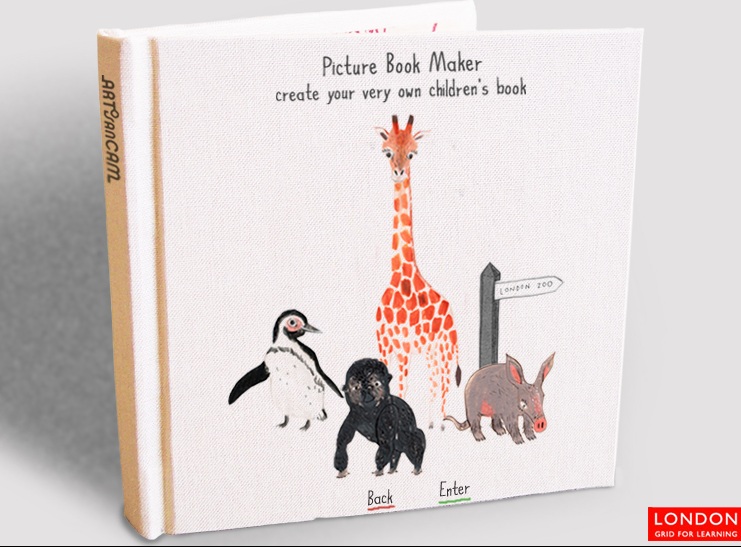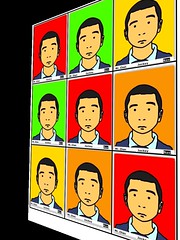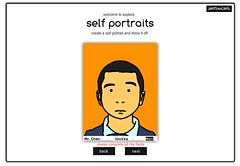Reception
Year 1

Year 2

What you can do at home
Reception and Nursery Children
Year 1 and Year 2 Children
Year 3
Year 4






Over at the British Council there are series of pages dedicated to learning English and it's in a range of languages to aid those starting out just for good measure.
In terms of ICT in the Early Years the stories are great for those children in Reception, Year 1 and 2 to listen to and complete the interactive lessons by downloading the accompanying .PDFs available underneath the flash games/ interviews or puzzles.
A lot of teachers will solely go to the page and play from there although there are several options available to those who wish to use the games in other places: blog/ class pages/ learning platform or ripped and stand alone. To do this you can use the following method:
If you use the Ctrl+U function (to get the page code) while on the pages showing the interactive then you can see the source code. Use Ctrl+F to search through the text to find .SWF in the page of code then you should come across something like this image here:
I'm using Google Chrome here but it will be almost the same in Firefox, Safari and Internet Explorer
Copy the .SWF URL in the page. Then, use the embed code from a YouTube video and replace all the URLs in there like I have below. The you can then embed this amended block of code into your pages/ blog/ learning platform. Very handy if you use Frog or Studywiz types.
Alternatively you can drop the URL ending in .SWF into a browser and it should play from there without all the distractions. Which, if you're with the little ones is marginally better for them and classroom management as you can make a desktop shortcut for them to hit up directly.
In bold are the URLs to be replaced from the search in the source code page below in hyperlink format.
<object width="480" height="385"><param name="movie" value="http://www.youtube.com/v/8kSCxwam2DU?fs=1&hl=en_US"></param><param name="allowFullScreen" value="true"></param><param name="allowscriptaccess" value="always"></param><embed src="http://www.youtube.com/v/8kSCxwam2DU?fs=1&hl=en_US" type="application/x-shockwave-flash" allowscriptaccess="always" allowfullscreen="true" width="480" height="385"></embed></object>
"http://learnenglishkids.britishcouncil.org/sites/kids/files/short-stories-the-haunted-house.swf"
over here is a new post on Storybird.
It's so good and imaginative have a look and get making.
It's been a while since the blog was updated and there's plenty of reason for this - new job,  summer holiday and been home without a care in the world. A tiny break in seeking out great resources and ideas for ICT.
summer holiday and been home without a care in the world. A tiny break in seeking out great resources and ideas for ICT.
Over here on the this page is a brand new set of applications replacing the outdated set that was there with all the broken links etc. This is, I believe one of the best list that includes Synths, players, media apps, CD Rippers, converters and notation editors that not only give a wide and varied scope to teaching music but many of them are Linux and Windows compatible.
Enjoy!
Beginning today I will create a series of posts relating to several topics covered at the Taipei European School's Primary ICT conference. The first covering these topics: Horizon Report, moshi monsters, Tutpup and the Fantastic Contraption game. Then, in subsequent weeks we'll look into the areas in the table below a little more closely:
To begin we'll look at the Horizon Report. What is it? It's a document put together by the New Media Consortium and what they do is look at emerging technologies across the the schooling age ranges. The report does have a strong focus on Higher Ed. but what is quite relevent for the primary school is how these ideas can integrate quite readily into mainstream classes: mobile devices as an example.The full document is below from Scribd.com with this snippet
In each edition of the Horizon Report, six emerging technologies or practices are described that are likely to enter mainstream use on campuses within three adoption horizons spread over the next one to five years. Each report also presents critical trends and challenges that will affect teaching and learning over the same time frame. In the seven years that the Horizon Project has been underway, more than 400 leaders in the fields of business, industry, technology, and education have contributed to this long-running primary research effort.
And...
The six technologies featured in each Horizon Report are placed along three adoption horizons that indicate likely time frames for their entrance into mainstream use for teaching, learning, or creative inquiry. The near-term horizon assumes the likelihood of entry into the mainstream for institutions within the next twelve months; the mid-term horizon, within two to three years; and the far-term, within four to five years
The key area I and many other primary school ICT teachers are interested in are the e-book/ readers and the hand-held devices such as the Nintendo DS, iPod touch, PSP, kindle/Sony et al e-Readers, GPS devices, cell phones and, now, to some degree tablets. The Tablets are more of an interest into the social side of ICT.
2010 Horizon Report 2010 Horizon Report
This is a logic style game that can be played either as a whole class (Year 4/5 up) or individually as a problem solving activity. The aim of the game is make machines in ever increasing difficulty by using the tools provided. It's similar to the magic pen game (link opens directly to full screen game) that provides lots of discussion points for Science and D+T. A worthy IWB whole-class plenary/ introduction/ D+T storyboard method of construction.
TutPup is a website that provides a perpetual challenge to
players who have signed up for this. The great thing about this site is that teachers have the option to make class sets and codes for the students. This means that they only play against their friends and not random people from around the world.
Alternatively, this could be a year group idea and play across the maths sets.
If you have lessons that go on longer than an hour it could provide the much needed 'brain break' to divert and channel attention to another strand of maths while maintaining the challenges of the lesson.

Things to do:
Adopt your very own monster
Name your monster and take care of it
Social networking functions including blogs and pin boards
Play games and earn Rox (virtual money)
Future Lab Quarterly. Articles to look out for. Wireless in Schools.Mathletics http://www.mathletics.co.uk/ Maths moves you: www.mathmovesu.com/ - a game like situation for maths 2diyarchive www.2diyarchive.co.uk/ excellent resources for 2DIY a package we will buy for August.
|
Which mobile devices do you use or would like to use in School?Voice Thread: www.voicethread.com - very good voice and image collaboration site. Primary Pad - http://primarypad.com/ realtime collaborative writing Pirate Pad - http://piratepad.net/ Etherpad - http://etherpad.com/ realtime collaborative writing
|
Ever thought of using Guitar Hero for Literacy? Myst for Story telling?Prezi - http://prezi.com/ replaces powerpoint, timelines Edu Glogster http://edu.glogster.com/ -Interactive posters, kids in the class can comment on friend's poster (you need a good internet connection) An example of using Edu.glogster ! http://bertjacha.edu.glogster.com/school-council/ Dipity - www.dipity.com – interactive timelines for Literacy and IPC,
|
What applications could you use on your class machines?Pretty things and Busy things for EYFS Cool Tools For School - http://cooltoolsforschools.wikispaces.com/ Free Tools http://web2educationuk.wetpaint.com/ - reviewed by the author |
Very quickly,
Hop on over to the downloads section and grab a copy of the full poster pack and assessment tools that we use in school. These are: a full set of Vocabulary posters for ICT and an assessment pack that allows teachers to create full sets of assessment sheets for all aspects of ICT in primary.
The files are on the large side so you might want to use a download manager of some description.

One of the best aspects that I like is some of the smallest touches and evidence that they are educators themselves is the use of a Glossary. They understand that teachers generally don't have time to know the finer points of IT. So, when confronted with new words and acronyms it not only puts people on edge it can turn potentially great users of ICT away from using great resources. This is how Futurelab excels: it doesn't patronise yet inspires with great ideas.
Below is their magazine which includes an interview with Tim Rylands a leader in game based learning; someting I'm quite passionate about at the moment.
Turn to the last page and you'll find a directory of upcoming seminars and conferences in and around Europe.
A direct donwload can be gotten from here: VISION MAGAZINE
 This weekend saw the 3rd FOBISSEA ICT conference for Primary ICT leaders being held at TES, Taipei. The city was a great surprise to me and held vast appeal for a techie and for somebody who loves Asia but would require the polite orderly-ness of mainland Europe.
This weekend saw the 3rd FOBISSEA ICT conference for Primary ICT leaders being held at TES, Taipei. The city was a great surprise to me and held vast appeal for a techie and for somebody who loves Asia but would require the polite orderly-ness of mainland Europe.
The Conference was again a relaxed affair with conversation flowing from one topic to the next. Below are a few snippets from the site we all contributed to and some of the links from last year's conference too. Lots of links and resources for teachers and pupils alike.
The Flat Classroom Project is a global Hands-on working together project for middle and senior high school students. It was founded by Vicki Davis (Westwood Schools, USA) and Julie Lindsay (Qatar Academy, Qatar) in 2006.
The Project uses Web 2.0 tools to make communication and interaction between students and teachers from all participating classrooms easier. The topics studied and discussed are real-world scenarios based on 'The World is Flat' by Thomas Friedman.
Below from Julie's site is a slide show detailing the Flat Classroom. The Flat Classroom Project will take you there.
The great thing about these conferences is the wealth of resources that come bundles with them. This year didn't dissappoint. Below are the list of web resources and applications that will undoubtedly go into this year's requisition.
Applications:
A review of lots of sites and progrms for learning - www.educationalfreeware.com
Education City - online learning platform in modules for the Primary age range.
Busy Things - http://www.busythings.co.uk/
AggregatorsMake Use Of http://www.makeuseof.com/
Games
TutPup http://www.tutpup.com/
Moshi Monsters http://www.moshimonsters.com/
Fantastic Contraption - http://fantasticcontraption.com/ Similar to Armadillo Run (try embedding to avoid adverts)
Armadillo Run - http://www.armadillorun.com/ Simulations
Maths
Mathletics http://www.mathletics.co.uk/
Maths moves you: www.mathmovesu.com/ - a game like situation for maths
2diyarchive www.2diyarchive.co.uk/ excellent resources for 2DIY
Birchfield http://www.birchfield.co.uk/ - VLE content pack apparantly compatable with the majority of SCORN based VLE's.
TimelinesCapzles - http://www.capzles.com/
Dipity - www.dipity.com -timelines, goes back to about 100AD, dates, maps (great for explorers/adventures), children can comment, use flip books, youtube videos, give kids the same login so that they can do collaborative work from home
Presentation
Vuvox www.vuvox.com/ more ambitious than animoto, timelines, storyboard, glossary, hotspot
Prezi - http://prezi.com/ replaces powerpoint, timelines
Edu Glogster http://edu.glogster.com/ -Interactive posters, kids in the class can comment on friend's poster (you need a good internet connection) An example of using Edu.glogster - not a particularly good one! http://bertjacha.edu.glogster.com/school-council/
SSUU - http://issuu.com/ make it in word and upload, magazines, newspapers, scan as pdf and make a book, or make a flipbook and embed
Video and sound Editors (online first)
Creaza - http://www.creaza.com/ -all in one package for movie making (integrates with Fronter)
Jamendo http://www.jamendo.com/en/ - Need an account, but also an alternative to Garage Band
Myna http://aviary.com/tools/myna - Online version of Garage Band
Collaboration:
Voice Thread: www.voicethread.com - very good voice and image collaboration site.
Primary Pad - http://primarypad.com/ realtime collaborative writing
Pirate Pad - http://piratepad.net/
Etherpad - http://etherpad.com/ realtime collaborative writing
Wall Wisher - http://www.wallwisher.com/ online post it note, great for homework.
Mind42 - http://www.mind42.com/ Free online mind mapping
Shelfari - http://www.shelfari.com/ online book club for librarians
EAL/ ESL - Languages
BYKI - http://www.byki.com/ creates online flash cards (great for MFL teachers)
Frengly - http://www.frengly.com/ Online translation
Tools for Primary School - www.primaryschooltools.com - This is my colleague's collection of links from BISV
Cool Tools For School - http://cooltoolsforschools.wikispaces.com/
Free Tools http://web2educationuk.wetpaint.com/ - reviewed by the author
NCH Software - www.nch.com.au Sound conversion software
Animation:
Monkey Jam - http://www.giantscreamingrobotmonkeys.com/monkeyjam/
Kahootz - http://www.kahootz.com/kz/ 3D Modelling
CB Model Pro- http://www.cbmodelpro.com/
Scibble Maps - http://scribblemaps.com/
Crazy Talk - http://www.reallusion.com/crazytalk/
Dino Mixer - http://www.dinomixer.com/ itouch app, great for KS1
Imaging - Web basedWord it Out http://worditout.com/ Similar to wordle
Tagul http://tagul.com/ Similar to wordle
Image Chef http://www.imagechef.com/
Posterazor http://posterazor.sourceforge.net/ -Makes huge posters
Big Huge Labs http://bighugelabs.com/
Picasa - http://picasa.google.co.uk/ Print huge pictures
Clevr - http://www.clevr.com/Will make panoramic pictures
|
 World Maths DayTomorrow is World Maths day. The school is going to go nuts for world maths day with both ICT labs open all day for drop in sessions. Today we had nearly all the Korean Year 6 children all competing with one another for bragging rights. It was seriously competitive with the numberpads getting a hammering.
World Maths DayTomorrow is World Maths day. The school is going to go nuts for world maths day with both ICT labs open all day for drop in sessions. Today we had nearly all the Korean Year 6 children all competing with one another for bragging rights. It was seriously competitive with the numberpads getting a hammering.
Good luck tomorrow to all nations.
www.ictopus.org.uk is a great website for all ICT teachers and teachers who want to use ICT creatively with their classes. SGP (sharing Good Practice) is released every week from the site once you sign up. You can also put your name forward to share ideas also. Click on the link below.